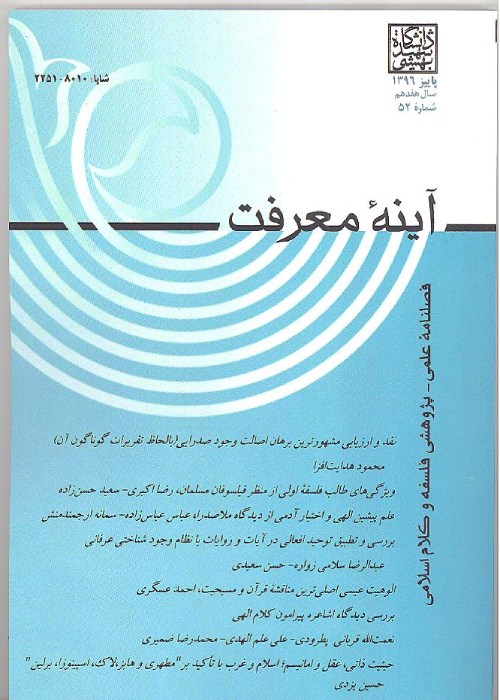Primitive and Common Predications in Ancient and Modern Logics
Author(s):
Abstract:
The distinction between the primitive predication and common predication is one the most important innovations of the Moslem logicians which was first introduced explicitly and used in Allamah Davani’s works and the later logicians such as Mulla Sadra and others benefited from it in solving logical and philosophical problems. Meanwhile, this distinctionhad been implicitly mentioned in the works of Aristotle, Al-Farabi and Avicenna and the primitive predication had been vehemently criticised and rejected. Surveying the works on logics at the two periods before and after Allamah Davani, the present article presents five logical and illogical reasons (reasons and causes) behind the opposition explained to the primitive predication in the works of the first period. The assumption is that without responding to these reasons the shift from the paradigm of the first period to that of the second seems less likely. Qutb Al-din Al-Razi and Qoushji from the first period and Davani form the second were the three logicians who responded to the five reasons and brought the primitive predication back from neglect and made it the key in solvingphilosophical problems.
Language:
Persian
Published:
Ayeneh Marefat, Volume:7 Issue: 19, 2009
Page:
28
magiran.com/p858790
دانلود و مطالعه متن این مقاله با یکی از روشهای زیر امکان پذیر است:
اشتراک شخصی
با عضویت و پرداخت آنلاین حق اشتراک یکساله به مبلغ 1,390,000ريال میتوانید 70 عنوان مطلب دانلود کنید!
اشتراک سازمانی
به کتابخانه دانشگاه یا محل کار خود پیشنهاد کنید تا اشتراک سازمانی این پایگاه را برای دسترسی نامحدود همه کاربران به متن مطالب تهیه نمایند!
توجه!
- حق عضویت دریافتی صرف حمایت از نشریات عضو و نگهداری، تکمیل و توسعه مگیران میشود.
- پرداخت حق اشتراک و دانلود مقالات اجازه بازنشر آن در سایر رسانههای چاپی و دیجیتال را به کاربر نمیدهد.
In order to view content subscription is required
Personal subscription
Subscribe magiran.com for 70 € euros via PayPal and download 70 articles during a year.
Organization subscription
Please contact us to subscribe your university or library for unlimited access!



